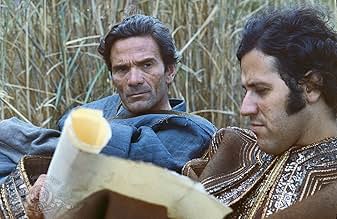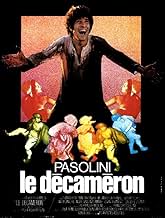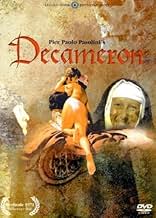ÉVALUATION IMDb
7,0/10
13 k
MA NOTE
Une adaptation de neuf histoires du « Décaméron » de Boccace.Une adaptation de neuf histoires du « Décaméron » de Boccace.Une adaptation de neuf histoires du « Décaméron » de Boccace.
- Prix
- 1 victoire et 3 nominations au total
Jovan Jovanovic
- Rustico
- (scenes deleted)
Maria Gabriella Maione
- Una madonna
- (as Gabriella Frankel)
Pier Paolo Pasolini
- Allievo di Giotto
- (as P.P. Pasolini)
Histoire
Le saviez-vous
- AnecdotesIl Decameron (1971) is the first film in Pier Paolo Pasolini's "Trilogy of Life," continuing with I racconti di Canterbury (1972) and concluding with Il fiore delle mille e una notte (1974). Each film was an adaptation of a different piece of classical literature focusing on ribald and often irreligious themes. The tales contain abundant nudity, sex, slapstick and scatological humor.
- GaffesWhen the Mother Superior seduces the deaf-mute boy, he's sleeping in a tomato garden. Tomatoes are a New World crop that wouldn't be brought to Italy for another two centuries. The same is true of the corn (maize) growing in the convent's little field.
- Citations
Allievo di Giotto: Why create a work of art when dreaming about it is so much sweeter?
- Autres versionsAlthough the cinema version was intact the 1988 UK Warner video was cut by 22 secs by the BBFC to remove shots of naked genitals during the bedroom sex scene with the nun. The cuts were fully restored in the 2001 BFI DVD release.
- ConnexionsEdited into Porno & libertà (2016)
- Bandes originalesFenesta Ca Lucive
Written by Guglielmo Cottrau, Vincenzo Bellini and Giulio Genoino in 1842
Performed by Franco Citti
Sung by Ser Ciappelletto and his Neapolitan hosts in Germany. Also sung by one of the Neapolitans to a monk.
Commentaire en vedette
Pasolini freely adapts ten or so episodes from Boccaccio's fourteenth century collection of hundred short stories. He interweaves the tales of happy or tragic lovers, naughty nuns and lusty priests, naive husbands and cheating but quick-witted wives, inept grave robbers, and a young gardener who got more than he had bargained for, with his own meditations on art, life, death and love. Pasolini himself plays a painter Giotto who observes the characters that inspire him to paint a fresco on the church's wall.
"Decameron" is the first part of Pasolini's "Trilogy Of Life", which continues with adaptations of two other celebrated works of world fiction; "The Canterbury Tales" (1972) and the "Arabian Nights" aka "A Thousand and One Nights" (1974). All these books have been known as distinguished and revered works of literature that belong to the immortal classics. There are probably so many big volumes have been written about them that it would take more than a thousand and one days and nights to read them. They talk about love, death, the meaning of life, and religion but first and most of all they entertain. At the time they were told and written down, no one would think of them as the future academic references. That's why they are so alive, earthy, coarse, and bold. I have not seen two other Pasolini's films but 'Decameron' captures the original spirit of Boccaccio's tales truthfully and with love, humanity, and perfect sense of the medieval Italy.
The film has a look of a renaissance painting not only Italian Renaissance (Giotto) but Netherlandish Northern Renaissance - Peter Bruegel and Hieronymus Bosch.
As he often did, Pasolin used in the film the non-professional actors to play the medieval peasants. They had none of the Hollywood glamor or classical features or perfect teeth and smiles but their faces are interesting, original, and real.
Full of rustic comedy and innocence, earthy humor and lust for life "Decameron" is one of the most optimistic, and celebrating life films ever made. Its sexuality is straightforward and honest, moving and not insulting. This film, my first Pasolini made me want to see the rest of the trilogy and the rest of his films.
"Decameron" is the first part of Pasolini's "Trilogy Of Life", which continues with adaptations of two other celebrated works of world fiction; "The Canterbury Tales" (1972) and the "Arabian Nights" aka "A Thousand and One Nights" (1974). All these books have been known as distinguished and revered works of literature that belong to the immortal classics. There are probably so many big volumes have been written about them that it would take more than a thousand and one days and nights to read them. They talk about love, death, the meaning of life, and religion but first and most of all they entertain. At the time they were told and written down, no one would think of them as the future academic references. That's why they are so alive, earthy, coarse, and bold. I have not seen two other Pasolini's films but 'Decameron' captures the original spirit of Boccaccio's tales truthfully and with love, humanity, and perfect sense of the medieval Italy.
The film has a look of a renaissance painting not only Italian Renaissance (Giotto) but Netherlandish Northern Renaissance - Peter Bruegel and Hieronymus Bosch.
As he often did, Pasolin used in the film the non-professional actors to play the medieval peasants. They had none of the Hollywood glamor or classical features or perfect teeth and smiles but their faces are interesting, original, and real.
Full of rustic comedy and innocence, earthy humor and lust for life "Decameron" is one of the most optimistic, and celebrating life films ever made. Its sexuality is straightforward and honest, moving and not insulting. This film, my first Pasolini made me want to see the rest of the trilogy and the rest of his films.
- Galina_movie_fan
- 2 oct. 2005
- Lien permanent
Meilleurs choix
Connectez-vous pour évaluer et surveiller les recommandations personnalisées
- How long is The Decameron?Propulsé par Alexa
Détails
- Date de sortie
- Pays d’origine
- Langues
- Aussi connu sous le nom de
- The Decameron
- Lieux de tournage
- sociétés de production
- Consultez plus de crédits d'entreprise sur IMDbPro
Box-office
- Brut – à l'échelle mondiale
- 839 $ US
- Durée1 heure 51 minutes
- Mixage
- Rapport de forme
- 1.85 : 1
Contribuer à cette page
Suggérer une modification ou ajouter du contenu manquant

Lacune principale
By what name was Il Decameron (1971) officially released in Canada in French?
Répondre



























